|
|
|
Sort Order |
|
|
|
Items / Page
|
|
|
|
|
|
|
| Srl | Item |
| 1 |
ID:
124878
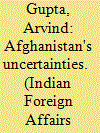

|
|
|
|
|
| Publication |
2013.
|
| Summary/Abstract |
What happens in Afghanistan post 2014 is uncertain. The situation being highly dynamic, it is difficult to make accurate forecasts. Most forecasts are gloomy, and predict political instability, a worsening security situation, a weak economy and violence. However, this pessimistic scenario need not materialise if post 2014 security mechanisms, economic assistance, and a stable political system are put in place. The outcome of the presidential elections on 5th April 2014, the nature of security uncertainties after 2014, and the success or failure of Karzai's efforts at reconciliation with Taliban would influence the situation post 2014.
|
|
|
|
|
|
|
|
|
|
|
|
|
|
|
|
| 2 |
ID:
064037
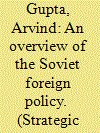

|
|
|
| 3 |
ID:
135045
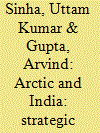

|
|
|
|
|
| Summary/Abstract |
A global temperature rise is being experienced earliest and most intensely in the Arctic region. The changes are worrying but the commercial interests are equally enticing. The Arctic is witnessing the convergence of the geophysical, the geo-economic and the geostrategic in strange and dramatic ways, making it a paradox and an antithesis. For India, the Arctic is distant when it comes to economic interests and near when it comes to climate change. As India today reassesses and rethinks its role in the new global geopolitical space, the Arctic becomes an important part of that reorientation and a movement towards a ‘global knowledge commons’. The Arctic is now an important geographical categorisation in India’s global policies. It must also be stressed that recent Arctic ascendancy in the policy domain stems directly from the strengthening of India’s climate change-linked economic and scientific positions in global world affairs.
|
|
|
|
|
|
|
|
|
|
|
|
|
|
|
|
| 4 |
ID:
173505
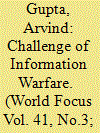

|
|
|
|
|
| Summary/Abstract |
It is high time we in India understood how Information and Communication Technologies (ICTs)are changing in the nature of conflict and warfare. ICTs have tremendous disruptive and destructive potential. Informationalisation of the battlefield is happening at an incredible pace. India will have to adapt to information wars which are happening as we speak. With the appointment of the Chief of Defence Staff, we are going to see an enhanced focus on jointness among the three services.
|
|
|
|
|
|
|
|
|
|
|
|
|
|
|
|
| 5 |
ID:
133611
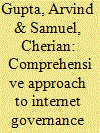

|
|
|
|
|
| Publication |
2014.
|
| Summary/Abstract |
The pressing issues around cyberspace revolve around internet governance, cybersecurity and drawing up rules of the road for the new domain of cyberwar. While each of these is at a different stage in its evolution cycle, cyberspace itself is facing a watershed moment as insecurities mount. The fragmentation of cyberspace seems inevitable unless there is accelerated movement on resolving the fundamental issues of internet governance and cybersecurity that have been hanging fire for well over a decade.
|
|
|
|
|
|
|
|
|
|
|
|
|
|
|
|
| 6 |
ID:
093869
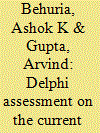

|
|
|
| 7 |
ID:
111282
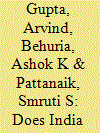

|
|
|
|
|
| Publication |
2012.
|
| Summary/Abstract |
The article argues that India does not have a well-defined neighbourhood policy. It makes a historical survey of the approaches of different Indian leaders to the neighbourhood and examines the reasons for the prevailing negative perceptions about India in the region. It argues that these negative perceptions have come about because India has largely adopted an ad hoc and bilateral approach vis-à-vis its neighbours and has allowed its policy to be guided by an overarching concern for security. In recent years, India's approach has changed considerably. However, it needs clearer articulation. The article suggests that India must effectively communicate its vision of regional integration to its neighbours, enable them to participate profitably in its growing economy, spell out its 'non-negotiables' in matters concerning its security and national interest, maintain linkages at the highest political level, open multiple tracks of communication and take a leadership position in multilateral forums like SAARC and BIMSTEC to bring peace and prosperity to the region through greater cooperation in diverse areas. This will prove effective in improving its relations with its neighbours.
|
|
|
|
|
|
|
|
|
|
|
|
|
|
|
|
| 8 |
ID:
112218
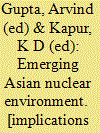

|
|
|
|
|
| Publication |
New Delhi, Lancer's Books, 2012.
|
| Description |
xv, 432p.
|
| Series |
Indian Pugwah Society
|
| Standard Number |
8170951240
|
|
|
|
|
|
|
|
|
|
|
|
Copies: C:2/I:0,R:0,Q:0
Circulation
| Accession# | Call# | Current Location | Status | Policy | Location |
| 056414 | 327.7305/GUP 056414 | Main | On Shelf | General | |
| 056415 | 327.7305/GUP 056415 | Main | On Shelf | General | |
|
|
|
|
| 9 |
ID:
130599
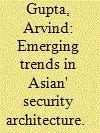

|
|
|
|
|
| Publication |
2014.
|
| Summary/Abstract |
The centre of gravity of international relations is shifting to Asia Pacific. The Asian region has been characterized by intense cold war rivalries; numerous territorial and maritime disputes, undemocratic A and oppressive regimes. The United States has been involved as an 'anchor of security in the region. Asian countries have seen acute financial crisis in the past. Many countries have been victims of terrorism, insurgencies, militancy, and fundamentalism. Resource Iigompetition is intensifying. Proliferation of weapons of mass destruction (WMD), presents a threat to the region. The past has "also been tainted with massive violence and bloodshed. The Korean _?._are claimed two million lives and the Vietnam War took three million fives. Internal pogroms by Khmer rouge claimed two million lives. .me of these issues like the divided Korean peninsula and the cross- t tensions between China and Taiwan still persist. The region
[nines to face formidable security challenges.
|
|
|
|
|
|
|
|
|
|
|
|
|
|
|
|
| 10 |
ID:
064104
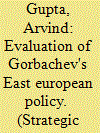

|
|
|
| 11 |
ID:
086227
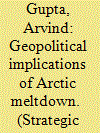

|
|
|
|
|
| Publication |
2009.
|
| Summary/Abstract |
The Arctic Ocean is melting at an alarming pace. In 2005, the extent of summer-time ice in the Arctic was the lowest in the last 50 years, and in 2007, it was 38 per cent lower than the average since 1978. During 1996-2007, summer-time ice in the Arctic declined at an annual rate of 11 per cent. At this rate, the Arctic Ocean may become totally free of ice in summer in a few years, maybe even by 2013. Scientists link the melting of ice in the Arctic Ocean to global warming. The meltdown in the Arctic is dramatic proof of the dire implications of climate change and also an indication of the worsening health of the planet.
|
|
|
|
|
|
|
|
|
|
|
|
|
|
|
|
| 12 |
ID:
161040
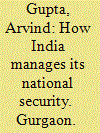

|
|
|
|
|
| Publication |
Gurgaon, Penguin Random House India Pvt Ltd, 2018.
|
| Description |
xxxiii, 410p.hbk
|
| Standard Number |
9780670090686
|
|
|
|
|
|
|
|
|
|
|
|
Copies: C:1/I:0,R:0,Q:0
Circulation
| Accession# | Call# | Current Location | Status | Policy | Location |
| 059501 | 355.033054/GUP 059501 | Main | On Shelf | General | |
|
|
|
|
| 13 |
ID:
004280
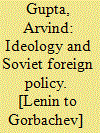

|
|
|
|
|
| Publication |
New Delhi, Venus Publishing, 1994.
|
| Description |
xii, 251p.
|
| Standard Number |
8172380070
|
|
|
|
|
|
|
|
|
|
|
|
Copies: C:1/I:0,R:0,Q:0
Circulation
| Accession# | Call# | Current Location | Status | Policy | Location |
| 035029 | 327.47/GUP 035029 | Main | On Shelf | General | |
|
|
|
|
| 14 |
ID:
140913
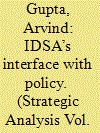

|
|
|
|
|
| Summary/Abstract |
The Institute for Defence Studies and Analyses (IDSA) can look back at its 50-year journey with satisfaction and pride. Undoubtedly a premier research institution in the country, it occupies a distinctive place in the community of prominent global think tanks as a leading centre for strategic research.
|
|
|
|
|
|
|
|
|
|
|
|
|
|
|
|
| 15 |
ID:
065353
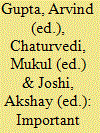

|
|
|
|
|
| Publication |
New Delhi, Manas Publications, 2005.
|
| Description |
518p.
|
| Standard Number |
8170492483
|
|
|
|
|
|
|
|
|
|
|
|
Copies: C:1/I:0,R:0,Q:0
Circulation
| Accession# | Call# | Current Location | Status | Policy | Location |
| 050044 | 327.54051/GUP 050044 | Main | On Shelf | General | |
|
|
|
|
| 16 |
ID:
117533
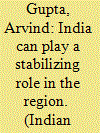

|
|
|
| 17 |
ID:
091265
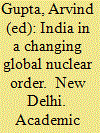

|
|
|
|
|
| Publication |
New Delhi, Academic Foundation, 2009.
|
| Description |
312p.
|
| Standard Number |
9788171887705
|
|
|
|
|
|
|
|
|
|
|
|
Copies: C:2/I:0,R:0,Q:0
Circulation
| Accession# | Call# | Current Location | Status | Policy | Location |
| 054422 | 327.54073/GUP 054422 | Main | On Shelf | General | |
| 054423 | 327.54073/GUP 054423 | Main | On Shelf | General | |
|
|
|
|
| 18 |
ID:
162077
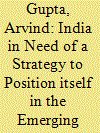

|
|
|
| 19 |
ID:
133605
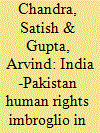

|
|
|
|
|
| Publication |
2014.
|
| Summary/Abstract |
It is relevant to recall the background to Pakistan's move to introduce this resolution. India was in a very difficult situation at the time. Kashmir was in flames due to a strong militant movement aided and abetted by Pakistan. Confrontation between the security forces and militants was an all too frequent occurrence. Moreover, India was far from being a rising power as is the case today. It had a minority government fighting for survival, hard put to address a myriad of serious problems like the demolition of the Babri Masjid and the subsequent Mumbai riots with an economy on the brink of bankruptcy. You would remember that a couple of years earlier, we had to mortgage gold to keep our economy afloat and India's diplomatic standing was, perhaps, at its lowest ever at that point in time. With hindsight, it is obvious that Pakistan had orchestrated its move to mount a resolution against us on Kashmir in tandem with its promotion of militancy there, so as to internationalise the issue and push us to the corner at a time when we were at our weakest.
|
|
|
|
|
|
|
|
|
|
|
|
|
|
|
|
| 20 |
ID:
088498
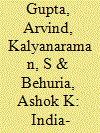

|
|
|
|
|
| Publication |
2009.
|
| Summary/Abstract |
India-Pakistan relations have been on a roller coaster. They reached a new low after
the Mumbai terror attacks of November 26, 2008. Tensions increased to such an
extent that the possibility of a war was openly talked about on both sides. However,
only a couple of hours before the attacks, the foreign ministers of the two countries
had appeared upbeat about the state of the peace process and the composite dialogue
which had started in January 2004.
The post-Mumbai situation brings to mind the Kargil episode of May 1999. A few
months before units of Pakistan's Northern Light Infanty were discovered in the icy
heights of Kargil, India and Pakistan were enjoying the honeymoon that had begun
with Prime Minister Vajpayee's visit to Lahore. Vajpayee's visit to Lahore, also
known as the Lahore Bus Yatra, was an attempt by the two sides to normalize the
bilateral relationship after the May 1998 nuclear weapons tests. Even as the Prime
Ministers of India and Pakistan were signing documents to normalize the relationship,
the Pakistan Army was planning intrusions into Indian territory. After the Pakistan
Army was forced to withdraw from the Kargil heights by Indian military operations
and international condemnation and pressure, the elected civilian government was
overthrown by the then Army Chief, General Parvez Musharraf, who ruled the
country for the next nine years.
|
|
|
|
|
|
|
|
|
|
|
|
|
|
|
|
|
|
|
|
|